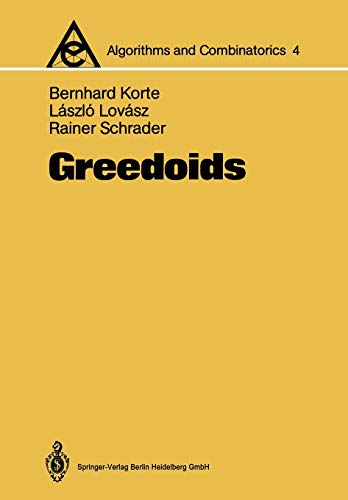Verwandte Artikel zu Greedoids: 4 (Algorithms and Combinatorics)

Reseña del editor
Oh cieca cupidigia, oh ira folie, Che si ci sproni nella vita corta, E nell' eterna poi si mal c'immolle! o blind greediness and foolish rage, That in our fleeting life so goads us on And plunges us in boiling blood for ever! Dante, The Divine Comedy Inferno, XII, 17, 49/51. On an afternoon hike during the second Oberwolfach conference on Mathematical Programming in January 1981, two of the authors of this book discussed a paper by another two of the authors (Korte and Schrader [1981]) on approximation schemes for optimization problems over independence systems and matroids. They had noticed that in many proofs the hereditary property of independence systems and matroids is not needed: it is not required that every subset of a feasible set is again feasible. A much weaker property is sufficient, namely that every feasible set of cardinality k contains (at least) one feasible subset of cardinality k - 1. We called this property accessibility, and that was the starting point of our investigations on greedoids.
Reseña del editor
With the advent of computers, algorithmic principles play an ever increasing role in mathematics. Algorithms have to exploit the structure of the underlying mathematical object, and properties exploited by algorithms are often closely tied to classical structural analysis in mathematics. This connection between algorithms and structure is in particular apparent in discrete mathematics, where proofs are often constructive, and can be turned into algorithms more directly. The principle of greediness plays a fundamental role both in the design of continuous algorithms (where it is called the steepest descent or gradient method) and of discrete algorithms. The discrete structure most closely related to greediness is a matroid; in fact, matroids may be characterized axiomatically as those independence systems for which the greedy solution is optimal for certain optimization problems (e.g. linear objective functions, bottleneck functions). This book is an attempt to unify different approaches and to lead the reader from fundamental results in matroid theory to the current borderline of open research problems. The monograph begins by reviewing classical concepts from matroid theory and extending them to greedoids. It then proceeds to the discussion of subclasses like interval greedoids, antimatroids or convex geometries, greedoids on partially ordered sets and greedoid intersections. Emphasis is placed on optimization problems in greedois. An algorithmic characterization of greedoids in terms of the greedy algorithm is derived, the behaviour with respect to linear functions is investigated, the shortest path problem for graphs is extended to a class of greedoids, linear descriptions of antimatroid polyhedra and complexity results are given and the Rado-Hall theorem on transversals is generalized. The self-contained volume which assumes only a basic familarity with combinatorial optimization ends with a chapter on topological results in connection with greedoids.
„Über diesen Titel“ kann sich auf eine andere Ausgabe dieses Titels beziehen.
- VerlagSpringer
- Erscheinungsdatum2012
- ISBN 10 3642634990
- ISBN 13 9783642634994
- EinbandTapa blanda
- SpracheEnglisch
- Anzahl der Seiten228
Neu kaufen
Diesen Artikel anzeigenEUR 14,08 für den Versand von Vereinigtes Königreich nach USA
Versandziele, Kosten & DauerSuchergebnisse für Greedoids: 4 (Algorithms and Combinatorics)
Greedoids (Algorithms and Combinatorics)
Anbieter: Ria Christie Collections, Uxbridge, Vereinigtes Königreich
Zustand: New. In. Artikel-Nr. ria9783642634994_new
Anzahl: Mehr als 20 verfügbar
Greedoids
Anbieter: AHA-BUCH GmbH, Einbeck, Deutschland
Taschenbuch. Zustand: Neu. Druck auf Anfrage Neuware - Printed after ordering - Oh cieca cupidigia, oh ira folie, Che si ci sproni nella vita corta, E nell' eterna poi si mal c'immolle! o blind greediness and foolish rage, That in our fleeting life so goads us on And plunges us in boiling blood for ever! Dante, The Divine Comedy Inferno, XII, 17, 49/51. On an afternoon hike during the second Oberwolfach conference on Mathematical Programming in January 1981, two of the authors of this book discussed a paper by another two of the authors (Korte and Schrader [1981]) on approximation schemes for optimization problems over independence systems and matroids. They had noticed that in many proofs the hereditary property of independence systems and matroids is not needed: it is not required that every subset of a feasible set is again feasible. A much weaker property is sufficient, namely that every feasible set of cardinality k contains (at least) one feasible subset of cardinality k - 1. We called this property accessibility, and that was the starting point of our investigations on greedoids. Artikel-Nr. 9783642634994
Anzahl: 1 verfügbar

